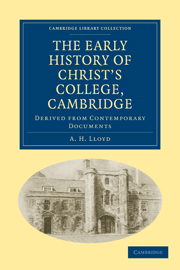Book contents
- Frontmatter
- Preface
- Contents
- LIST OF ILLUSTRATIONS
- List of Abbreviations
- Chronological Summary
- Dedication
- Chapter I William Byngham, the First Founder
- Chapter II The Dispute with John Langton
- Chapter III The First Royal Licence, 1439
- Chapter IV The Expansion of the Milne Street Site
- Chapter V The Royal Licences of 1442
- Chapter VI Marking Time: 1443 to 1446
- Chapter VII The Royal Licence of 1446 and its period
- Chapter VIII The Foundation Charter of the College of Godshouse and its period
- Chapter IX The Relationship of Godshouse and Clare Hall
- Chapter X The Last Days of William Byngham
- Chapter XI The Proctorship of John Hurte, 1451–1458, and of William Fallan, 1458–1464
- Chapter XII The Proctorship of William Basset, 1464–1477
- Chapter XIII The Proctorship of Ralph Barton, 1477–1490
- Chapter XIV The Proctorship of John Syclyng: Early Years, 1490–1496
- Chapter XV The Proctorship of John Syclyng: Later Years, 1496–1506
- Chapter XVI The Negotiations between Godshouse and the Lady Margaret
- Chapter XVII Syclyng's Death and Will
- Chapter XVIII The Buildings and Furniture remaining from the Godshouse period
- Chapter XIX Godshouse and Christ's College
- Appendix
- Index
- Plate section
Chapter XIV - The Proctorship of John Syclyng: Early Years, 1490–1496
Published online by Cambridge University Press: 05 October 2010
- Frontmatter
- Preface
- Contents
- LIST OF ILLUSTRATIONS
- List of Abbreviations
- Chronological Summary
- Dedication
- Chapter I William Byngham, the First Founder
- Chapter II The Dispute with John Langton
- Chapter III The First Royal Licence, 1439
- Chapter IV The Expansion of the Milne Street Site
- Chapter V The Royal Licences of 1442
- Chapter VI Marking Time: 1443 to 1446
- Chapter VII The Royal Licence of 1446 and its period
- Chapter VIII The Foundation Charter of the College of Godshouse and its period
- Chapter IX The Relationship of Godshouse and Clare Hall
- Chapter X The Last Days of William Byngham
- Chapter XI The Proctorship of John Hurte, 1451–1458, and of William Fallan, 1458–1464
- Chapter XII The Proctorship of William Basset, 1464–1477
- Chapter XIII The Proctorship of Ralph Barton, 1477–1490
- Chapter XIV The Proctorship of John Syclyng: Early Years, 1490–1496
- Chapter XV The Proctorship of John Syclyng: Later Years, 1496–1506
- Chapter XVI The Negotiations between Godshouse and the Lady Margaret
- Chapter XVII Syclyng's Death and Will
- Chapter XVIII The Buildings and Furniture remaining from the Godshouse period
- Chapter XIX Godshouse and Christ's College
- Appendix
- Index
- Plate section
Summary
Hurte, Fallan and Basset were elected into the proctorship of Godshouse from outside, Hurte from Clare, Fallan from his archdeaconry of London and his rectory of St Magnus there, Basset from his prebendal stall in the college of Stoke Clare. Byngham, from being in its early days the head of the college, under the name of ‘ordainer’, became its first Proctor when its royal founder issued his charter. Barton, fellow and lecturer, succeeded to the proctorship in the natural order of promotion, and was followed by Syclyng, a son of the house who had served his apprenticeship to the position as president of his predecessor. This last item of information comes from a statement made by John Syclyng himself in a formal document prepared under his instructions, if not written by his own hand, and used by him on a formal occasion in accordance with the statutes of Godshouse. In presenting the half-yearly statement of account to the fellows of Godshouse on 18 April 1491, he says that he does so ‘for the whole time in which he was occupied in the said office of Proctor and for the whole time in which he was occupied as president of Master Ralph Barton in the aforesaid office of Proctor immediately preceding’. As Syclyng was the last Proctor of Godshouse (the name of the college being changed to Christ's, and the description of its head to Master in his time) there were six Proctors in all, of whom three were chosen from within the college and three from without.
- Type
- Chapter
- Information
- The Early History of Christ’s College, CambridgeDerived from Contemporary Documents, pp. 215 - 250Publisher: Cambridge University PressPrint publication year: 2010First published in: 1934



